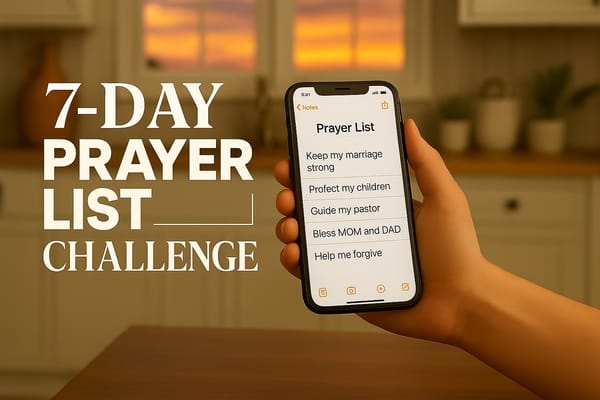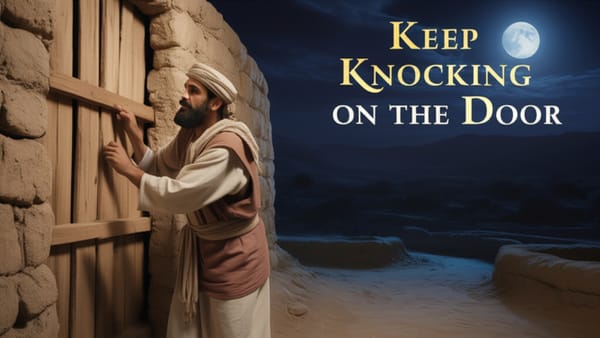Job: The Forgotten Priest of the Family

His sons used to go and hold a feast in the house of each one on his day, and they would send and invite their three sisters to eat and drink with them. And when the days of the feast had run their course, Job would send and consecrate them, and he would rise early in the morning and offer burnt offerings according to the number of them all. For Job said, 'It may be that my children have sinned, and cursed God in their hearts.' Thus Job did continually." (Job 1:4–5, ESV)
In a culture that often reduces fatherhood to financial provision or mere physical presence, the story of Job reveals a profound truth: the father as the covenant priest of his household. Before the tabernacle stood in the wilderness, before Aaron donned the ephod, fathers bore the sacred responsibility of representing their families before Almighty God.
Job—whom the Lord Himself declared "blameless and upright, one who fears God and turns away from evil" (Job 1:8)—demonstrates this priestly calling with an intensity that should convict every father today. His example magnifies God's glory by revealing what it means to truly shepherd a family's souls.
The Weight of Spiritual Headship
In the ancient world, the patriarch served as both judge and priest for his household. This was no ceremonial role but a matter of life and death, blessing and curse. Job understood that his children's eternal destiny hung in the balance, and he refused to leave their spiritual welfare to chance.
Notice the deliberate nature of his actions: "Job would send and consecrate them." The Hebrew word for "consecrate" (qadash) means to set apart as holy, to purify for sacred use. Job didn't merely pray over his children—he formally dedicated them to God, treating their souls as the most precious treasure entrusted to his care.
This mirrors the Father's heart, who "chose us in him before the foundation of the world, that we should be holy and blameless before him" (Ephesians 1:4). Job's consecration of his children reflects God's eternal purpose to sanctify His people, bringing glory to the One who calls us into holiness.
The Dawn Warrior
"He would rise early in the morning and offer burnt offerings according to the number of them all."
While his children slept off their feasting, Job was already at the altar, pleading their case before heaven. This wasn't convenience worship—it was costly. Rising early meant sacrificing sleep, comfort, and personal time. Offering burnt offerings meant sacrificing wealth, as each animal represented significant economic value.
But Job counted the cost and paid it gladly. Why? Because he understood that his children's souls were worth infinitely more than his comfort or possessions. His predawn intercession demonstrates the truth that "where your treasure is, there your heart will be also" (Matthew. 6:21).
As a father and a grandfather, I believe this is part of my calling: to backstop my children when they are in need—not only with my prayers but with my love, my presence, and even my wealth if necessary. The world calls this enabling. Scripture calls it covering. Job’s example tells us that the cost of interceding, protecting, and providing for our family—even when they have wandered—is worth paying. Spiritual leadership is not cheap, and real love always comes with a price.
This dawn discipline glorifies God by showing what it means to "seek first the kingdom of God" (Matthew. 6:33). Job's sacrificial love for his children's spiritual welfare reflects the Father's love for us—a love that spared not His own Son but gave Him up for us all (Romans. 8:32).
The Hidden Battlefield
Job's motivation reveals profound spiritual insight: "It may be that my children have sinned, and cursed God in their hearts."
Notice that Job was concerned not with outward behavior but with the heart's condition. He understood that sin begins in the secret places of the soul—in thoughts, attitudes, and hidden resentments against God. The Hebrew phrase suggests not just cursing but "blessing God" in a sarcastic, bitter way—the kind of secret rebellion that eats away at faith from within.
Job knew that unconfessed heart-sin is like a cancer, slowly destroying spiritual life. His preemptive intercession shows a father who fought for his children's souls on the invisible battlefield where the real war is waged.
This vigilance glorifies God by acknowledging His omniscience and righteousness. Job understood that "the Lord sees not as man sees: man looks on the outward appearance, but the Lord looks on the heart" (1 Samuel 16:7). His concern for hidden sin honors God's perfect knowledge and holy standards.
The Rhythm of Faithfulness
"Thus Job did continually."
This wasn't a seasonal practice or an occasional burst of spiritual fervor. The Hebrew word tamid means "regularly," "perpetually," "without interruption." Job had established a rhythm of priestly intercession that defined his life. After every feast cycle, without fail, he was at the altar.
This consistency reveals the character that God Himself commended. Job's faithfulness wasn't dependent on circumstances, emotions, or results. It was rooted in his understanding of who God is and what his children needed. Rain or shine, feast or famine, Job stood in the gap.
Such steadfastness magnifies the Lord's own faithfulness. Just as God's mercies are "new every morning" and His faithfulness is "great" ( Lamentations:22-23), Job's continual intercession reflects the unchanging nature of divine love and the constancy required of those who would lead their families in righteousness.
The Greater Priest
Job's many sacrifices for many sins point us to the ultimate reality: Jesus Christ, the one perfect sacrifice for all sin, offered once for all time (Hebrews. 10:10). Where Job offered bulls and rams repeatedly, Christ offered Himself definitively. Where Job's intercession was limited to his earthly family, Christ's intercession extends to all who belong to Him by faith.
Yet the parallel is profound. Just as Job stood between his children and God's judgment, Christ stands between us and the wrath we deserve. Just as Job rose early to plead for his family, Christ "always lives to make intercession" for His people (Hebrews 7:25). Just as Job's sacrifices covered potential sins, Christ's sacrifice covers actual sins—past, present, and future.
This connection magnifies the glory of God's redemptive plan. Job's imperfect but faithful priesthood points to the perfect priesthood of Christ, who fulfills every type and shadow in the beauty of His finished work.
The Call to Modern Fathers
Job's example thunders across the centuries with this message: Your family needs a priest, and God has appointed you to the role.
The priesthood of fathers doesn't require animal sacrifices, but it demands something equally costly: your time, your prayers, your spiritual leadership, and your willingness to stand between your family and the forces that would destroy them.
Consider these applications:
Daily Intercession
Follow Job's pattern by establishing a regular time to pray for each family member by name. Plead for their salvation, sanctification, and protection from spiritual dangers they may not even recognize.
Spiritual Vigilance
Like Job, be alert to the heart-condition of your family. Watch for signs of spiritual drift, rebellion, or secret struggles. Create an environment where confession is safe and restoration is celebrated.
Proactive Leadership
Don't wait for crises to seek God. Lead your family in worship, Bible reading, and prayer. Make your home a sanctuary where God's presence is welcomed and His Word is treasured.
Sacrificial Love
Be willing to sacrifice your comfort, convenience, and personal desires for your family's spiritual good. Early mornings, difficult conversations, and costly decisions are the price of faithful spiritual leadership.
These actions bring glory to God by demonstrating that earthly fathers can reflect the heart of our heavenly Father, who seeks and saves the lost and shepherds His people with unfailing love.
When Tragedy Strikes
Job's faithfulness didn't prevent suffering. In one devastating day, he lost his children, his wealth, and eventually his health (Job 1:13-19, 2:7). Yet when the dust settled, God pointed to Job's character and declared him righteous.
This teaches us that faithful priesthood isn't measured by outcomes we can control but by obedience we can choose. We cannot guarantee our children's salvation or shield them from all harm, but we can ensure that when trials come, we are found faithful in our God-given role.
Job's perseverance through unimaginable loss glorifies God by proving that true faith isn't dependent on circumstances. His unwavering commitment to intercede for his family, even after losing them, reveals the kind of love that reflects God's own character—a love that never fails, never gives up, never lets go.
The Eternal Perspective
Job's story ultimately points us beyond earthly fatherhood to our identity in Christ. For those who have believed in Jesus, we are all priests in God's kingdom (1 Peter 2:9), called to intercede not only for our families but for a lost world.
Whether you are a father leading your household or a believer standing in the gap for others, Job's example calls you to take spiritual responsibility seriously. In a world drowning in spiritual apathy, be the one who rises early, who prays continually, who stands between the holy God and those you love.
The Question That Changes Everything
God Himself testified of Job: "There is none like him on the earth, a blameless and upright man, who fears God and turns away from evil" (Job 1:8). Part of what made Job unique was his faithful intercession for his family.
So here is the question that should pierce every heart:
If God were to examine your life tonight, would He find you faithfully standing in the priestly gap for your family—or would He find you distracted by lesser things while their souls go uncovered?
A Call to Rise
Let Job's example awaken us from spiritual slumber. In the name of Jesus Christ, the great High Priest, let us rise early, pray fervently, and intercede faithfully for those God has placed under our care.
May our homes become altars where God's name is hallowed, our prayers become incense that rises before His throne, and our lives become living sacrifices that bring Him glory. And may we trust in the perfect priesthood of Christ, who covers our inadequacies with His righteousness and transforms our feeble intercession into effective prayer through His mighty name.
"The effective, fervent prayer of a righteous man avails much" (James 5:16). Let us be those righteous ones, standing in the gap, bringing glory to God through faithful spiritual leadership in our homes.
Soli Deo Gloria.





